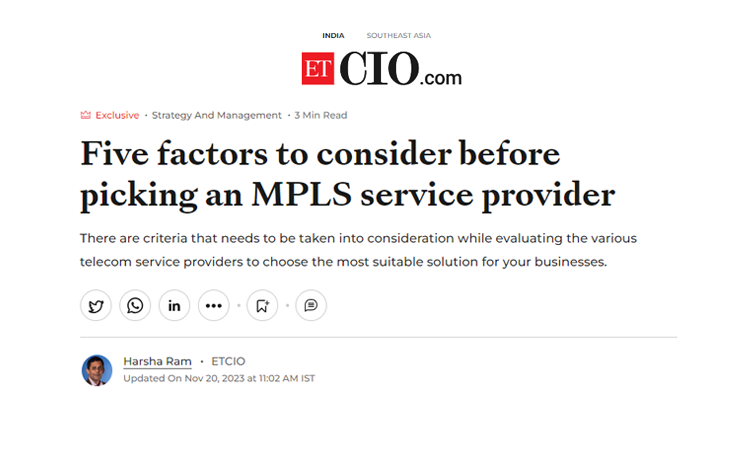Five factors to consider before picking an MPLS service provider
Read this article on https://cio.economictimes.indiatimes.com/news/strategy-and-management/five-factors-to-consider-before-picking-an-mpls-service-provider/105346203.

Read this article on https://cio.economictimes.indiatimes.com/news/strategy-and-management/five-factors-to-consider-before-picking-an-mpls-service-provider/105346203.

A member of the Indian Administrative Service (IAS 1978, Jharkhand cadre), Dr. Sharma has had a distinguished service record of more than four decades, leading reforms and leveraging IT to simplify administrative processes, thus, contributing to shaping India’s policies in Information and Communication Technologies (ICTs).
As the founding Director General and Mission Director of the Unique Identification Authority of India (UIDAI), Dr. Sharma helped formulate and launch Aadhaar, India’s first and the world’s largest biometric identity system, an experience that eventual found expression in a process biography- ‘Making of Aadhaar: World’s largest Identity Platform’.
Dr. Kumar has been instrumental in boosting performance of Defence PSUs during 2018-2022 and promoting startups in the drone and space sector between 2020-2021. Dr. Kumar holds a B.Tech in electrical engineering, a Master’s degree in applied economics from the University of Minnesota and a PhD in business administration from the Carlson School of Management at the University of Minnesota. On superannuation, Dr. Kumar assumed the position of Distinguished Visiting Professor in the Department of Management Sciences and the Department of Economic Sciences at the Indian Institute of Technology, Kanpur.

A Chartered accountant, Cost accountant and Company secretary by training, M P Vijay Kumar or MPV as he is fondly known, was recently elevated to the post of Executive Director and Group CFO of Sify Technologies. He is also an Independent Director and Chairman of the Audit Committee on the Board of The Life Insurance Corporation of India (LIC) and an Independent Director on the Boards of Geojit Financial Services Limited and Heritage Foods Limited.
He also serves as a Member on the IFRS Interpretation committee of International Accounting Standards Board and IFRS Advisory Council of the IFRS Foundation, London. He served as Council Member of Institute of Chartered Accountants of India (2016-2022), was Chairman of Accounting Standards Board and Ex Officio Member of National Financial Reporting Authority for the period 2019-2022.
He has played central roles in industry associations, being part of the CFO Forum, the National Committee on Financial Reporting and the Accounting Standards Board of the Confederation of Indian Industry (CII).
His distinguished career has been embellished with National and International awards, the latest being the BusinessWorld CFO of the Year for 2021. Previous recognitions include being among the 100 most influential CFO’s in India by CIMA, making the Roll of Honour of the Top 100 CFOs in India and the National Award for contribution to Financial Accounting by Capital Foundation Society.
He is a speaker on the professional circuit on IFRS, Accounting Standards, Audit, Corporate Laws and Capital Market and an author of over 8 popular titles on Accounting, Accounting Standards, Audit Standards and Company Law that are in continuous reprints.
His early professional engagements include being a Partner at chartered accountants’ firm, Yoganandh & Ram. Prior to them, he headed the Investment Banking portfolio in addition to being Company Secretary of Sundaram Finance Services Ltd., Chennai, the Investment Banking arm of Sundaram Finance Limited.

Ms. Padmaja Chunduru is a seasoned financial services executive with over 40 years of banking and capital markets experience in India and USA. She has led iconic institutions, NSDL (National Securities Depository Ltd.) and Indian Bank as the MD&CEO. As Deputy Managing Director, SBI (State Bank of India) she led digital banking services and also served as the Country Head, US Operations.
Ms. Chunduru was also instrumental in NSDL developing and running a DLT Blockchain based platform for Security and Covenant Monitoring of Corporate Debt, a first such initiative in India, an important milestone on the their roadmap to listing.
As MD & CEO of Indian Bank, Ms. Chunduru successfully steered the merger of 2 PSU Banks. Significant improvement in all key business metrics and the empathetic handling of the cultural integration of two diverse banks became the subject of a case study “Merger of Equals” by Harvard Business School Publishing.
Ms. Chunduru has been on Boards of LIC (Life Insurance Corporation of India), NPCI (National Payments Corporation of India), ISSA (International Securities Services Association) and ACG (Asia Pacific Central Depository Group), Institute of International Bankers and Asia Society, New York.
Currently she is a member of the Insurance Advisory Committee of IRDAI (Insurance Regulatory and Development Authority of India) and the CCGS Advisory Council, IIMB. (Centre for Corporate Governance and Sustainability, IIM Bangalore)
She has been awarded Best CEO (BFSI) for 2021 by Business Today and Best CEO 2021 for Women Leadership by Economic Times. She has been acknowledged as one of the Most Powerful Women (MPW) in Business by Fortune India and Business Today, for the years 2022 and 2023.

Sharad Agarwal takes over the mantle of the Chief Executive Officer of Sify Infinit Spaces Limited, wholly owned subsidiary of Sify Technologies Limited topping a diverse career path with 28+ years of consistent growth. A decade of it was spent in Technology Implementation, Professional Services and Consulting and close to two decades in management; among them finding solutions to complex problems at multi-billion dollars scale at high double-digit growth rate.
Sharad moves into this role on the strength of his technopreneurship across several domains like ecommerce, logistics, retail, Cloud and Data Center. An active industry veteran, he comes equipped with a combination of sales and project management skills that will help him expand the footprint and acceptance of Sify’s data centers. He is active on the industry front, scripting the narrative between the industry and the regulatory and also a committed advocate of the use of renewables in the Data Center business.
Prior to Sify, Sharad was at Vantage, where he was mandated to build their Data Center business. This was preceded by a long stint at Amazon Web Services where he front-ended capacity delivery for an APAC region.

An alumni of the prestigious Le Martiniere school, Indian Institute of Technology, Kanpur and Indian Institute of Management, Calcutta, Mr. Arun Seth is recognised as among the earliest Indian Telecom leaders. He started out as the founding Managing Director of British Telecom in India in 1995, helping it acquire a 45% stake in Airtel and seeing through its transformation, first to Mahindra BT and eventually to Tech Mahindra. He relinquished office as its non-Executive Chairman in 2012 after an illustrious stint on its Board for 17 years.
He has been a founding Charter Member of TiE Delhi and Indian Angel Network and advises/mentors a number of start-ups in the tech space in India and USA. An active evangelist of the Software product eco-system, he co-chairs the NASSCOM Product Conclave and the NASSCOM Product Council. He had earlier served on the Executive Council of NASSCOM for 10+ years when in British Telecom and Alcatel.
He is very active with NGOs, currently chairing NASSCOM Foundation which drives CSR initiatives across the IT Industry. His particular focus has been in working with NGOs that support the disadvantaged sections. He has served on the Board of Governors for IIM Lucknow and IIIT Delhi and also been an Advisory board member of TERI and a Governing Member of the TERI University board.

Bala Saraswathi Vegesna served as Finance Controller of ServerWorks Corporation and is presently the Director of the Raju Vegesna Foundation. Today, she guides the foundation in its multiple welfare activities, both in India and the U.S.

An Indian Administrative Service officer of the 1985 batch, Dr. Ajay Kumar, last served as the Defence Secretary for the Government of India and has deep expertise in the technology and policy domains. Previously, as head of several government enterprises, he has scripted major successes in defence industry ecosystem including defence startup ecosystem through iDEX between 2017-2022, Digital India initiatives including Aadhaar, UPI, Jeevan Pramaan between 2014-2017 among others.
Dr. Kumar has been instrumental in boosting performance of Defence PSUs during 2018-2022 and promoting startups in the drone and space sector between 2020-2021. Dr. Kumar holds a B.Tech in electrical engineering, a Master’s degree in applied economics from the University of Minnesota and a PhD in business administration from the Carlson School of Management at the University of Minnesota. On superannuation, Dr. Kumar assumed the position of Distinguished Visiting Professor in the Department of Management Sciences and the Department of Economic Sciences at the Indian Institute of Technology, Kanpur.

A globally feted technologist, Dr. Bradicich previously served on several boards, including that of Aspen Technology (AZPN), a publicly traded industrial software company, and the Advisory Boards of SparkCognition, an AI software company and a social media and silicon chip start-up. Dr. Bradicich’s professional career was spent in global leadership roles at Fortune 500 IT companies such as IBM and HPE where he and his team developed and launched dozens of software and systems products, received many patents, and conceived the trademarks HPE Edgeline™ Systems, IBM xArchitecture™ Systems, IBM MXT™ Memory, and National Instruments Big Analog Data™ Solutions.
He was three times named CRN’s Top 100 Executives and Top 25 Disrupters, elected to the IBM Academy of Technology, honored as a Life Member of the IEEE, and inducted into the North Carolina State University Alumni Hall of Fame. Active in charity work, he served as executive sponsor to The Salvation Army, and founded sockrelief.com, serving the homeless and children in need. Dr. Bradicich is a recipient of many awards, including the IBM Chairman’s Award, CRN Product of the Year, Frost & Sullivan Best Practice, Gartner Magic Quadrant Leader, Network World Product of the Year, Mobile World Congress Best of Show and Automation World Leadership Award.
He is currently writing a book, The 1st Mover, a collection of his vast experience in business leadership, creating new product categories and technical innovation.

C.R.Srinivasan is the CEO of Sify Digital Services Limited, bringing over 30 years of experience in global telecom, IT, cybersecurity, and digital services. Srini is a seasoned technologist and business leader with a proven track record in large enterprises, start-ups, and platform-based businesses.
He has leveraged technology to enhance customer experiences and develop unique business models, successfully turning around and rapidly scaling businesses by building platforms and services centered on the right technology. Before joining Sify, Srini led Tata Communications’ Cloud and Cybersecurity businesses.
He also co-founded Sevenstrata IT Services, a remote infrastructure management company acquired by Mindtree. Srini was part of the initial team that established Sify’s network and services and developed its managed services capabilities. His previous experience includes roles at Citibank NA and CMS Computers. Srini holds a bachelor’s degree in engineering from the University of Madras. He enjoys reading, gardening, and spending time with his family, and is currently based in Chennai.


Sify offers the assurance and confidence customers seek through SSAE18 SOC 1-Type 2, validating the effectiveness of our internal controls and processes to ensure reliable financial reporting and enhance trust in their business operations.

Sify demonstrates its dedication to environmental management through ISO 14001, enabling customers to reduce their environmental impact, strengthen their reputation as environmentally conscious organizations, and contribute to a sustainable future.
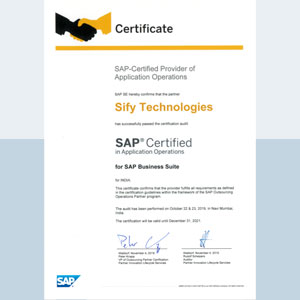
Offering maintenance, daily operation, and ongoing functional support for SAP business applications. These services can currently be certified for SAP Business Suite.
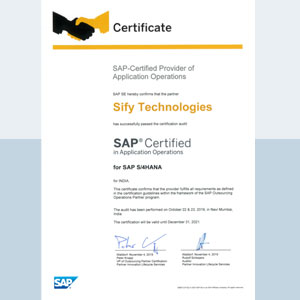
Offering maintenance, daily operation, and ongoing functional support for SAP business applications. These services can currently be certified for SAP S/4HANA.
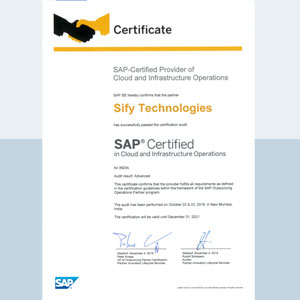
Offering an infrastructure and cloud services portfolio tailored to SAP customers. Cloud service offerings from providers certified by SAP encompass on-demand infrastructure and on-demand services for SAP products.
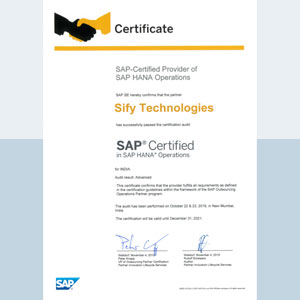
Delivering operations services for solutions powered by the SAP HANA business data platform, with high-quality operational standards.
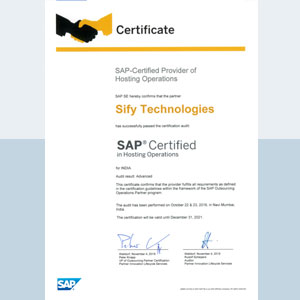
Operating and maintaining SAP applications, and offering complete hosting packages tailored to the customer’s SAP product portfolio. Extensive technical SAP administration skills and experience are mandatory.
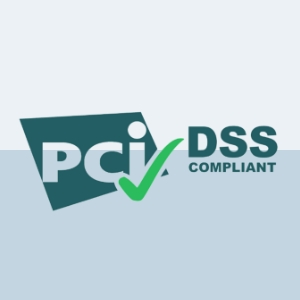
Sify ensures that customers utilizing data center colocation services have peace of mind with PCI DSS compliance, which guarantees robust physical security measures to safeguard their sensitive data, mitigating the risk of unauthorized access and ensuring adherence to industry standards for data protection.

Sify demonstrates its commitment to data security, confidentiality, availability, processing integrity, and privacy through SSAE18 SOC 2-Type 2, providing customers with assurance that their information is handled with the highest level of security, reliability, and compliance.

Sify necessitate ISO 45001 to create a safe and healthy workplace, reducing accidents and focusing on staff well-being to boost output and contentment among Sify’s clientele.

Sify leverages CMMi for development to deliver software products of exceptional quality, built with a robust structure and reliability, that precisely align with our customers’ expectations and strategic business objectives.

Sify leverages CMMi for service to deliver customized, high-quality, and efficient services that precisely cater to the unique needs and requirements of our customers, ensuring their satisfaction and reliability.

Sify utilizes TL9000 to ensure the delivery of high-quality telecommunications products and services, enabling enhanced customer satisfaction and improved operational efficiency for our customers.

Sify, as a Colocation Data Center service provider, leverages TIA-942 Tier 3 standards to offer customers a dependable and resilient data center infrastructure that incorporates redundant components, thereby mitigating the risk of downtime and ensuring uninterrupted availability of their critical systems and applications.

For better data privacy and protection, Sify uses ISO 27018 to help customers set up reliable guidelines for protecting their data in cloud services, guarantee compliance with privacy regulations, and increase trust and transparency in their data handling procedures.

Sify implements ISO 27017 to help customers manage and secure their cloud-based information, ensuring the privacy, integrity, and accessibility of their data while also improving their cloud security posture.

Sify uses ISO 27001 to reassure clients that their data is safe and secure because to the company’s dedication to best practises in information security.

Sify uses ISO 20000-1 to guarantee that its clients receive IT services of the highest quality, specifically designed to match their individual business needs. This increases both productivity and client happiness.

Sify utilizes ISO 9001 to ensure consistent quality, deliver reliable products/services, and enhance customer satisfaction through its robust quality management practices.
Howard joined Sify Technologies as Managing Director of Europe in July 2021 and has enjoyed continued success with year-on-year growth from the outset. To further the growth of the European business Howard has overseen the expansion of the organisation’s capabilities to include managed services which complement the networking and data centre offerings.
Under Howard’s leadership, Sify Europe has significantly developed existing client relationships and secured new contracts with some of the largest names in the Technology sector.
Prior to joining Sify, Howard enjoyed a successful career in the Telecoms industry. Since the late 90’s he has worked for industry-leading organisations such as Energis, Level 3 Communication and Colt Technology, where he held notable positions leading Regional Sales organisations.
Howard is committed to the growth and development of Sify’s Europe region and is proud to be leading an outstanding team that shares the same passion and desire for success as he does.

Justin joined Sify Technologies as Head of Solutions Architecture in March 2017 then later appointed as European Commercial Director and is now Regional CTO for UK & EU. Justin holds responsibility for Sify’s regional vision and strategy for its Cloud & Managed Services go-to-market.
Justin is a Cloud business solutions veteran with a distinguished career of more than 30 years in the Telecoms and IT Industry. He has worked for some of the largest global service providers in today’s market such as Interoute and KPN International (now operating as EXA), Colt Technologies, and British Telecom.
During his tenure as senior leader Justin has managed teams of technology professionals to successfully deliver world-class solutions across several vertical market sectors including Manufacturing, Transport & Logistics, Construction, and Information Technology Enabled Services. He is a recognised industry professional with certifications in The Open Group Architecture Framework (TOGAF) and Microsoft, AWS and Oracle Cloud.

C E S Azariah rose through the ranks within India’s oldest financial institution, the State bank of India, before retiring as Chief General Manager. He then joined the Fixed Income, Money Markets, & Derivatives Association of India (FIMMDA), as CEO. At FIMMDA, he was a member of the High Power Committee on Corporate Bonds and Securitization, set up the Corporate Bond Trade Reporting Platform, and drafted the FIMMDA Code of Conduct which has since been mandatory for all G.Secs market participants.

C B Mouli is an expert in taxation and corporate law. He currently chairs the audit committee for Sify in addition to his duties as Director.
C B Mouli is a member of the Institute of Chartered Accountants of India and also holds a Bachelor of Law Degree. He is a partner of C.B. Mouli & Associates, a Chartered Accountants firm. He is also a Director on the Board of Ammana Bio Pharma Limited and Ammana Equity Fund Private Limited.

Dr. T H Chowdary runs the Center for Telecommunication Management and Studies in Secunderabad. His years of service with the government established him as a consummate advisor and mentor for new age industries.
From 1989-1993 he was Chairman of the Bharatiya Vidya Bhavan (the Indian Institute of Culture) Hyderabad, establishing and managing eight public schools in the States of Andhra Pradesh and Karnataka. He also was previously on the Governing Body of the University College of Engineering, Osmania University, and served as a member of the Governing Board of the American Studies Research Center (ASRC), Hyderabad.
Dr. T H Chowdary is a senior member of the IEEE, New York, Fellow of the Institution of Engineers in India, Distinguished fellow of the Institute of Electronics & Telecom Engineers in India, and was a past president of IETE in India. An active philanthropist and community leader, he is Chairman of Pragna Bharati, an association of national intellectuals that publishes articles on different topics in Telugu newspapers.

Ananda Raju Vegesna has served as an Executive Director of Sify since June 2007.
He also serves as Managing Director of Infinity Satcom Universal Private Limited and a Director of Village Inns Limited, Raju Vegesna Infotech & Industries Limited, Raju Vegesna Developers Private Limited, and Ramanand Core Investment Company Private Limited.

A veteran of the aviation industry and an seasoned operations leader, C R Rao moved up the organisational ranks to occupy the office of the Chief Operating Officer at Sify. Starting out as Head of Human Resources, his acumen as trained lawyer and his networking skills quickly thrust him into the pivotal role of COO when the company was shifting to high gear in the Data Center and Network spaces.
His indefatigability to address and assuage bureaucracy and clients alike has been instrumental in the timely delivery of Data Centers in multiple geographies to different sets of clients. He has also been responsible for scaling up both the bench and active resources according to the demands of multiple contracts. In his over two decades of setting the direction for the Operations team, he has been instrumental in cross functional engagement of resources across multiple projects.
An ardent technology adopter who views it as a productive tool, he has spearheaded the implementation of automation across internal processes that has resulted in a significant uptick in ROI per employee.
His skills were honed at his previous management roles at Delta Tubes Pvt Ltd and Bobba Aviation Services – GSA Lufthansa Cargo engagement.
He holds graduate degrees in law, commerce and Business Administration from Osmania University.

Kamal entered the CEO’s office in 2012 and quickly transitioned it into the most comprehensive ICT solutions and services provider in India.
As CEO, he has successfully led Sify’s transformation from an Enterprise Network and Data Center Service Provider to a Converged ICT Solutions and Services organization. A decade later, under his guidance, Sify has consistently grown in revenue and profitability and has emerged as a preferred Service Provide Partner for Enterprises, Public Sector & Government in India.
Sify is currently uniquely positioned as both Service Provider as well as Systems Integration Partner for organizations in the midst of their digital transformation journey.
Prior to joining Sify, Kamal Nath had a 17-year tenure at HCL Technologies, where in his last assignment as Country Sales & Business Head he led various transformational engagements with large Enterprises, incubated new business services, created innovative business models, and developed new and high-growth vertical customer segments.

David Nishball is one of the leading experts in building and managing enterprise telecom operations in the Asia Pacific Region. He led the enterprise segment for a number of global operators, joint venture companies, and emerging market operators.
He brings over 28 years of experience to Sify, spanning various roles and functions in the telecommunications industry, including 18 years in the Asia Pacific Region alone.
David Nishball was President of Airtel Enterprise Services from 2007-2010, a business unit of Bharti Airtel Ltd., India’s leading telecom service provider. Prior to joining Bharti Airtel, he was a Senior Vice President, Asia Pacific, for Orange Business Services (formerly Equant), based in Singapore. He managed Orange’s business operations in Japan, Korea, Greater China, India, and Australasia. From 1982-2002, he held a number of strategic positions with AT&T and its related companies, playing a key role in supporting and managing several global ventures. This included serving as Regional Head of Concert Asia Pacific, a joint venture between BT and AT&T, where he led the global accounts sales, carrier services, and distribution organizations.
David Nishball was a founding officer of WorldPartners Company, a global telecommunications services venture between AT&T, KDD Japan, Singapore Telecom and Unisource, serving as Vice President of Marketing.
He holds a Master of Business Administration degree from the University of California, Berkeley, Haas School of Business, and a Bachelor of Arts degree in Economics with an Engineering emphasis, also from U.C. Berkeley.

Raju Vegesna is a serial technology entrepreneur with a multi-decade series of successes. Before Sify, he was the founder and CEO of ServerEngines, an industry leader in network and storage convergence products that grew rapidly from its inception in 2003 to its acquisition by Emulex in 2010. Raju Vegesna then served as Chief Strategist for Emulex, responsible for the company’s strategic direction and evangelizing the adoption of Emulex products to key customers and partners.
Raju Vegesna currently serves as the Chairman and Managing Director of Sify Technologies Limited, after having purchased a majority stake in 2005. Prior to ServerEngines and Sify, Raju Vegesna founded ServerWorks Corporation in 1994. He led the company as it became the world leader in computer chipsets, commanding a 90% market share in the x86 server chipset market. ServerWorks was acquired by Broadcom Corporation for US$1.8 billion in 2001. Before ServerWorks, Raju Vegesna co-founded and served as chief architect of Ross Technology Inc., spearheading the creation of the HyperSparc processor, a CPU used by Sun Microsystems to create its first multiprocessor computer servers. Before joining Ross Technology, Raju Vegesna worked as an engineer for Motorola, where he created the microcode for Motorola’s 68030 processor and the specification for the 68040 microprocessor.
He received a master’s degree in computer engineering from Wayne State University and a bachelor’s degree in electronics engineering from Bangalore University. Raju Vegesna holds several patents on microprocessors and multiprocessor technologies. The Raju Vegesna Foundation funds programs to address the availability of clean water and education for communities in need.


of organisations cited a lack of resources and expertise as one of their top cloud challenges
Working with a trusted partner like Sify can offer the right combination of flexibility, expertise and affordability, all essential elements if businesses are to stay competitive.
Sify offers a breadth and depth of cloud expertise with an affordable cost model, to help SMBs optimise their cloud infrastructure and fill gaps in their in-house skills.

of organisations are struggling to optimise costs post-migration
To continue to grow, SMBs now need to focus on optimising their cloud-based infrastructures to improve efficiency, performance and security.
The IT skills shortage, particularly in the area of cloud, is a critical barrier to taking full advantage of cloud technologies.

of SMBs plan to prioritise IT modernisation as a key business goal to bolster cybersecurity and benefit the hybrid workforce model
Many businesses have eagerly embraced cloud in recent years, migrating existing workloads and data, and building new cloud-native applications.
However, this has left many businesses with complex, fragmented infrastructures that are costly, difficult to manage and lead to increased security and compliance risks.

Fintech is driving global innovation that is
transforming how companies, consumers, and
money interact across industries, from financial
services to retail to transportation and beyond.
Utilizing AI, fintech interactions are more
personalized with recommendation engines, self-
service is enhanced via conversational AI, and
transactions are more secure with the use of deep
learning fraud detection models. And that’s just the
beginning.
Read Blog: Learn How Leading Fintechs Are
Transforming the Industry With AI
Fintech is driving global innovation that is transforming how companies, consumers, and money interact across industries, from financial services to retail to transportation and beyond.Utilizing AI, fintech interactions are more personalized with recommendation engines, self-service is enhanced via conversational AI, and transactions are more secure with the use of deep learning fraud detection models. And that’s just the beginning.
Read Blog: Learn How Leading Fintechs Are Transforming the Industry With AI
AI and the Impact on
Insurers
Firms are moving beyond traditional claims
management by embracing digital opportunities and
adopting a fully analytics-driven approach. This
includes using AI to automate claims handling for
simple and clean cases, implementing AI-powered
services to fast-track complex cases, and creating
new digital services to increase customer satisfaction.
AI and the Impact on Insurers
Firms are moving beyond traditional claims management by embracing digital opportunities and adopting a fully analytics-driven approach. This includes using AI to automate claims handling for simple and clean cases, implementing AI-powered services to fast-track complex cases, and creating new digital services to increase customer satisfaction.
Accelerated Computing for
Trading
Faster processing results in smarter trade s
trategies, more successful trade execution, and
increased revenue. GPU-powered hardware
acceleration decreases time to insight, allowing
operations to remain competitive.With NVIDIA
technology, financial institutions can harness the
power of AI and high-performance computing (HPC)
to learn from vast amounts of data and respond
quickly to market fluctuations.
Read Blog: NVIDIA Sets Records on the STAC-
A2 Benchmark Risk Models
Accelerated Computing for Trading
Faster processing results in smarter trade strategies, more successful trade execution, and increased revenue. GPU-powered hardware acceleration decreases time to insight, allowing operations to remain competitive. With NVIDIA technology, financial institutions can harness the power of AI and high-performance computing (HPC) to learn from vast amounts of data and respond quickly to market fluctuations.
Read Blog: NVIDIA Sets Records on the STAC-
A2 Benchmark Risk Models
Building the AI-Powered
Bank
Financial institutions are adopting AI to deliver
smarter, securer services. GPU-powered AI solutions
can centralize data to drive deeper, more holistic
insights, offload routine tasks from employees with
automation, accelerate risk calculations and fraud
detection, and enhance customer service with
conversational AI and more accurate recommender
systems.
Building the AI-Powered Bank
Financial institutions are adopting AI to deliver smarter, securer services. GPU-powered AI solutions can centralize data to drive deeper, more holistic insights, offload routine tasks from employees with automation, accelerate risk calculations and fraud detection, and enhance customer service with conversational AI and more accurate recommender systems.
Fraud Prevention
Strategies for Digital
Payments
Transferring money to friends and family. Paying
bills online. Using your phone to check out at the
grocery store. Payments—online, mobile, in-store,
business-to-consumer (B2C), and business-to-
business (B2B)—power the global economy.AI can
help banking firms better detect and prevent
payment fraud and improve processes for anti-
money laundering (AML) and know-your-customer
(KYC) systems. Enable greater security, more
transparency, and create a better experience for
both firms and customers with AI in payments.
Read Blog: American Express Adopts NVIDIA AI
to Prevent Fraud and Foil Cybercrime
Fraud Prevention Strategies for Digital Payments
Transferring money to friends and family. Paying bills online. Using your phone to check out at the grocery store. Payments—online, mobile, in-store, business-to-consumer (B2C), and business-to-business (B2B)—power the global economy.
AI can help banking firms better detect and prevent payment fraud and improve processes for anti-money laundering (AML) and know-your-customer (KYC) systems. Enable greater security, more transparency, and create a better experience for both firms and customers with AI in payments.
Read Blog: American Express Adopts NVIDIA AI
to Prevent Fraud and Foil Cybercrime
Optimize GPU utilization, expand access to more users with guaranteed quality of service (QoS)

NVIDIA DGX A100 is the world’s first AI system built on the NVIDIA A100 Tensor Core GPU. Integrating eight A100 GPUs with 320GB or 640GB of GPU memory, the system provides unprecedented acceleration and is fully optimized for NVIDIA CUDA-X™ software and the end-to-end NVIDIA data center solution stack.

AI infrastructure re-imagined, optimized, and ready for enterprise AI-at-scale

